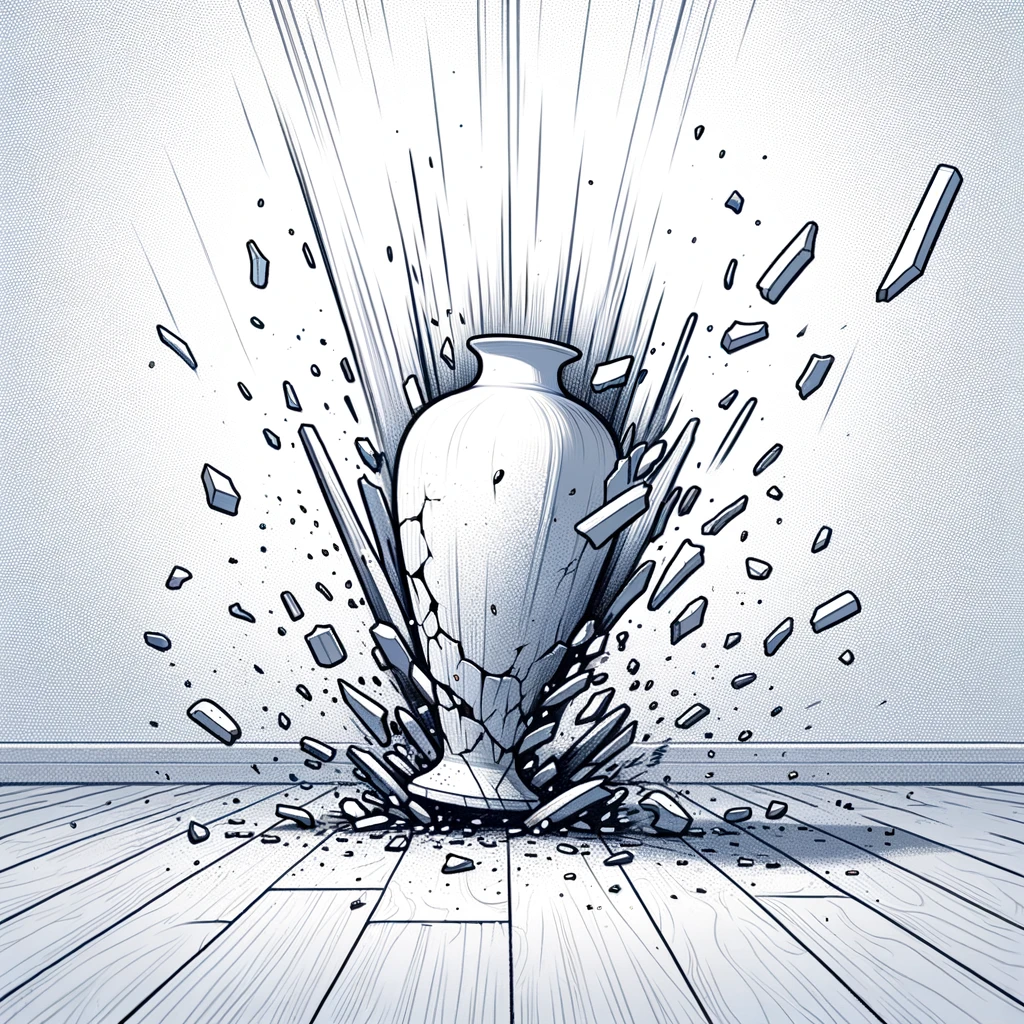Smash
Definition
"Smash" refers to the act of breaking something into pieces violently or noisily, or hitting something with great force. It also describes a striking success, especially in the context of entertainment or sports. Additionally, "smash" can denote a powerful and fast stroke or shot in sports.
Parts of Speech
- Verb
- Noun
- Adjective
Pronunciation
American English
- IPA Pronunciation: /smæʃ/
- Respelling: SMASH (with "SMASH" rhyming with "cash" and "dash")
British English
- IPA Pronunciation: /smæʃ/
- Respelling: SMASH (similar to American English, with "SMASH" rhyming with "cash" and "dash")
In both dialects, "smash" is pronounced with a short "a" sound, as in "cash" or "dash." The pronunciation of "smash" is consistent between American and British English, clearly reflecting the word's straightforward phonetic structure.
Etymology
The word "smash" originates from the mid-18th century, perhaps imitative of the sound of smashing. It conveys the idea of breaking something with a sudden, violent blow or impact.
Derivatives
- Smasher (noun)
- Smashing (adjective, noun)
- Smashingly (adverb)
- Smashable (adjective)
- Smashed (adjective, past participle verb)
Synonyms
- Shatter
- Crush
- Break
Antonyms
- Repair
- Construct
- Assemble
Usage
- As a verb: "He smashed the window with a rock."
- As a noun: "The movie was a smash hit at the box office."
- As an adjective: "The band delivered a smash performance."
Related Terms
- Smash hit: A highly successful song, film, show, or other entertainment product.
- Smashing success: An event, project, or endeavor that achieves tremendous success.
- Smash and grab: A type of theft where windows are smashed to grab valuables quickly.
Detailed Definition
As a Verb:
- To break something into pieces violently and noisily: "The vase smashed to the floor."
- To hit or attack someone or something with great force: "The waves smashed against the rocks."
As a Noun:
- The act or sound of something being smashed: "The smash of glass could be heard from the street."
- A powerful and effective stroke or shot in sports, especially in tennis, badminton, and volleyball: "She won the point with a powerful smash."
As an Adjective:
- Denoting something highly successful or impressive: "Their smash album topped the charts for weeks."
smash



🇨🇳 Mandarin (Simplified Chinese)
- Break: 粉碎 (fěnsuì)
- IPA Pronunciation: /fən˨˩˦.swɛi˨˩˦/
- Respelling in English: FEN-sway
- Hit: 猛击 (měngjī)
- IPA Pronunciation: /məŋ˨˩˦.tɕi˥/
- Respelling in English: MENG-jee
🇮🇳 Hindi
- Break: तोड़ देना (toṛ denā)
- IPA Pronunciation: /toɽ de.naː/
- Respelling in English: TOR deh-na
- Hit: मारना (mārnā)
- IPA Pronunciation: /maːr.naː/
- Respelling in English: MAR-na
🇪🇸 Spanish
- Break: romper
- IPA Pronunciation: /ˈrom.peɾ/
- Respelling in English: ROM-per
- Hit: golpear
- IPA Pronunciation: /golˈpe.aɾ/
- Respelling in English: gol-PEH-ar
🇫🇷 French
- Break: briser
- IPA Pronunciation: /bʁi.ze/
- Respelling in English: BREE-zay
- Hit: frapper
- IPA Pronunciation: /fʁa.pe/
- Respelling in English: FRA-pay
🇸🇦 Modern Standard Arabic
- Break: كسر (kasara)
- IPA Pronunciation: /kas.ara/
- Respelling in English: kah-SAH-rah
- Hit: ضرب (ḍaraba)
- IPA Pronunciation: /dˤa.ra.ba/
- Respelling in English: DAR-rah-bah
🇧🇩 Bengali
- Break: ভাঙা (bhāṅgā)
- IPA Pronunciation: /bʱaŋga/
- Respelling in English: BHANG-ga
- Hit: আঘাত (āghāt)
- IPA Pronunciation: /aːɡʱaːt/
- Respelling in English: AGH-aat
🇷🇺 Russian
- Break: разбивать (razbivat')
- IPA Pronunciation: /rɐzˈbʲivətʲ/
- Respelling in English: raz-BEE-vat'
- Hit: ударять (udaryat')
- IPA Pronunciation: /ʊˈdarʲɪtʲ/
- Respelling in English: oo-DAR-yat'
🇵🇹 Portuguese
- Break: quebrar
- IPA Pronunciation: /keˈbɾaɾ/
- Respelling in English: keh-BRAR
- Hit: bater
- IPA Pronunciation: /baˈteɾ/
- Respelling in English: bah-TER
🇮🇩 Indonesian
- Break: menghancurkan
- IPA Pronunciation: /məŋ.han.tʃʊr.kan/
- Respelling in English: meng-HAN-chur-kan
- Hit: memukul
- IPA Pronunciation: /mə.mu.kul/
- Respelling in English: meh-MOO-kool
🇩🇪 German
- Break: zerschlagen
- IPA Pronunciation: /tsɛʁˈʃlaːɡən/
- Respelling in English: tser-SHLA-gen
- Hit: schlagen
- IPA Pronunciation: /ˈʃlaːɡən/
- Respelling in English: SHLA-gen
🇯🇵 Japanese
- Break: 壊す (kowasu)
- IPA Pronunciation: /ko.wa.sɯ̥ː/
- Respelling in English: KO-wah-soo
- Hit: 打つ (utsu)
- IPA Pronunciation: /ɯ̟ᵝ.t͡sɯ̥ː/
- Respelling in English: OO-tsoo
🇻🇳 Vietnamese
- Break: phá vỡ
- IPA Pronunciation: /pha˧ˀ˩ vɔj˧˩˧/
- Respelling in English: PHA voy
- Hit: đánh
- IPA Pronunciation: /zən˧ˀ˩/
- Respelling in English: ZAN
🇰🇷 Korean
- Break: 부수다 (busuda)
- IPA Pronunciation: /pu.su.da/
- Respelling in English: BOO-soo-dah
- Hit: 때리다 (ttaerida)
- IPA Pronunciation: /tʰɛ.ɾi.da/
- Respelling in English: TAE-ree-dah
🇹🇷 Turkish
- Break: kırmak
- IPA Pronunciation: /kɯɾˈmak/
- Respelling in English: KEER-mahk
- Hit: vurmak
- IPA Pronunciation: /vuɾˈmak/
- Respelling in English: VOOR-mahk
🇵🇰 Urdu
- Break: توڑنا (toṛnā)
- IPA Pronunciation: /toɽ.naː/
- Respelling in English: TOR-na
- Hit: مارنا (mārnā)
- IPA Pronunciation: /maːr.naː/
- Respelling in English: MAR-na





